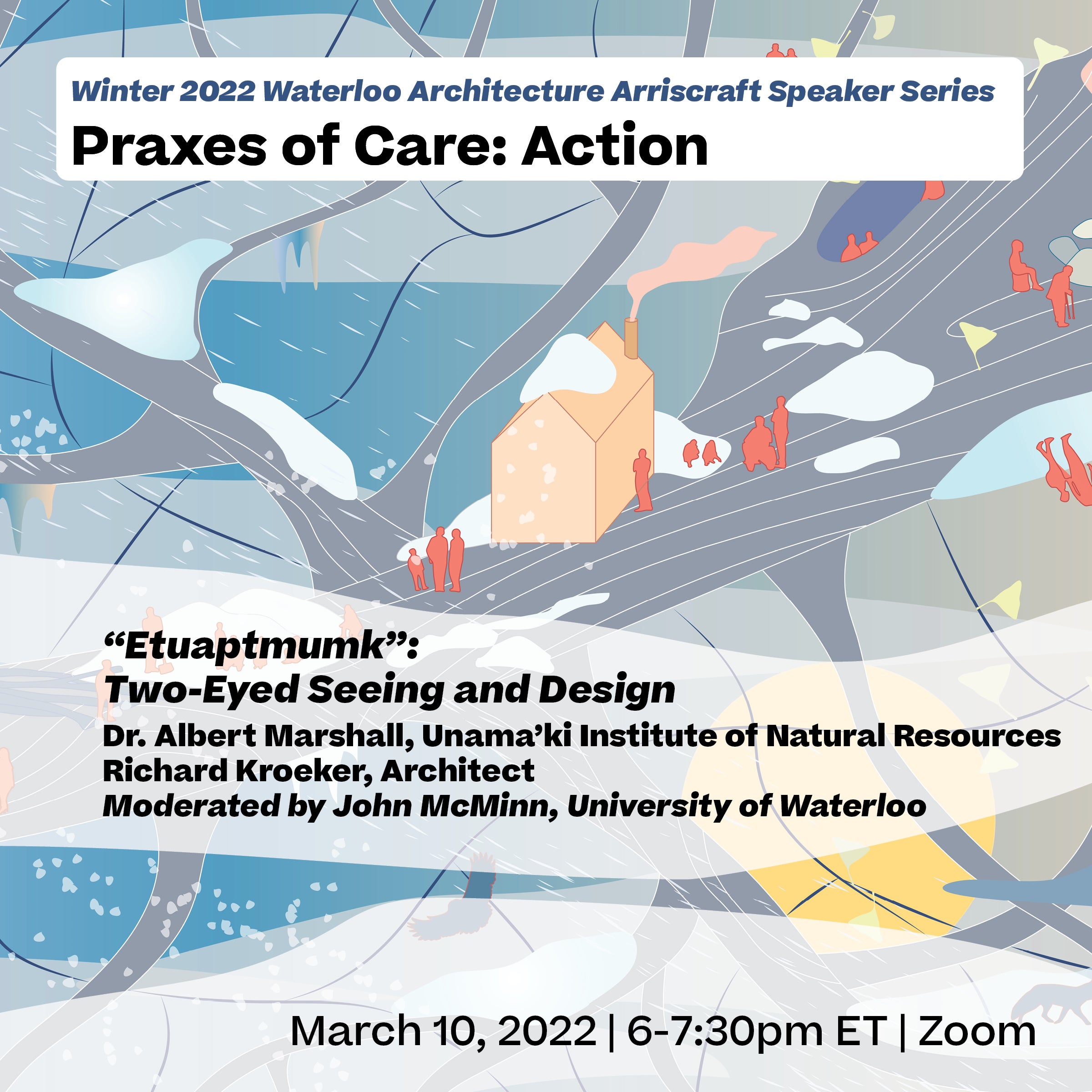
In Honour of Andrew Levitt, celebrating the legacy of a Professor Emeritus dedicated to teaching on care, and with care.
Please join us for "Etuaptmumk": two-eyed seeing design the third of five conversations on the theme of action, with speakers Dr. Albert Marshall, Unama'ki Institute of Natural Resources, and Richard Kroeker, Architect. Their short presentations will be followed by a discussion moderated by John McMinn, University of Waterloo.
SPEAKER BIOS
Richard Kroeker is a UK registered architect and Professor Emeritus at Dalhousie University. As well as teaching full time at Dalhousie University School of Architecture for many years, he been visiting professor at University of Minnesota, Peter Behrens School of Arts, Norwegian University of Technology, and University of Gambia. During his teaching career he has maintained a design practice; the work has been recognised with a Chicago Athenaeum International Building of the Year Award, Erich Schelling Medal in Architecture, Design Exchange Canadian Cultural Building of the Year Award, American Architecture Bronze Medal for Landscape Structures, Nova Scotia Lieutenant Governor’s Masterwork Award, Dalhousie Senate Environment Award, Nova Scotia Association of Architects Keystone Award. Richard’s work has explored how ideas and knowledge systems embedded in indigenous ways of thinking and building are expressed through architecture, can support cultural continuity within those cultures, and can inform the surrounding cultural contexts within which they often exist. Richard has worked together with Albert Marshall for a number of years, exploring how Mi’kmaq thinking can inform the education process, and how we approach building in relationship with geography and history to create continuity through reconciliation.
Elder Dr. Albert Marshall is a Mi’kmaw member of the Moose clan from the community of Eskasoni.As a young boy, Elder Dr. Marshall was forcefully taken from his family in Eskasoni, Unma’ki-Cape Breton, and spent many years as an inmate of Shubenacadie Residential School in mainland Nova Scotia, isolated from his family, under s system where education was used as an instrument of cultural genocide. This experience had a profound effect, and has led him on a quest to understand the culture from which he was removed and the culture into which he was forced. It has been his life-long task to find ways where such different cultures can meet in a place of mutual respect. Albert is a passionate advocate for “Two-eyed Seeing” , drawing attention to its deep origins in concepts within Mi’kmaw culture where it emerged amongst the aboriginal people of North America with the longest experience of living side by side with European newcomers. Elder Albert continues to work tirelessly to bring Two-Eyed Seeing to bear on diverse projects regionally , nationally, and internationally, bringing together indigenous understanding and ways of knowing, with mainstream knowledge and knowledge systems, for the collective benefit of the whole community of life, and all of us within it.
Elder Albert has been a tireless advocate for our collective environment. He was a key participant together with 23 elders from Mi’kmaw, Wolostoqiyik, Innu, and Innuit communities in Atlantic Canada within the Atlantic Policy Congress of First Nations Chiefs to bring forward Eight Recommendations on the appropriate consultation of elders on all aspects of education, health, law and matters pertaining to the wider environment and our responsibilities within it. Elder Dr. Albert Marshall acts as teacher and advisor at a number of Universities across Canada, and internationally, including acting as elder advisor to Native American Engineering Student Society at Massachusetts Institute of Technology, advisory work with Humber College at University of Toronto, Trent University, University of New Brunswick, Cape Breton University, Acadia, University, as well as his long involvement with Dalhousie University, particularly with the School of Architecture. Albert’s work has been honoured with a doctorate from Acadia University ( 2018) and a joint doctorate with his wife Dr. Murdena Marshall (deceased 2018) from Cape Breton University ( 2009).
Accessibility: Waterloo Architecture is committed to achieving accessibility for persons with disabilities who are attending the event. Closed Captioning will be available during the live event. For accommodation questions and requests, please contact us in advance of the event at adudnik@uwaterloo.ca.
For more information on this series and other events presented by Waterloo Architecture, please visit waconnect.ca or follow us @waterloo_architecture.
If you enjoy this lecture series and would like to help the School of Architecture continue to provide similar education activities and engagement opportunities, please visit our support page. Thank you for your dedication to our students and to our School!